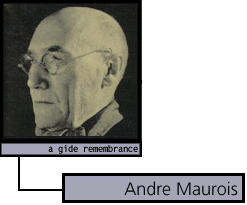
Andre Maurois, born in 1885, has achieved popular
and critical acclaim in France, England, the United
States and Germany. Writer of plays, short stories
as well as biographies of such authors as Shelly, Byron,
Voltaire and Balzac, Maurois has always concerned
himself with stories that possess both wit and irony,
offering readers a chance to eavesdrop on the lives
and loves of a world of artists, actresses, diplomats
and fellow writers.
This excerpt is taken from Maurois' book
To the Fair Unknown (Bodley Head, 1957)
Do you like Andre Gide? For my own part I used to find him a companion whose culture and boundless curiosity fascinated me. Later on I lost touch with the man, who had disappointed me, although I never passed so harsh a judgment on him as have certain books published since his death. In them Gide is seen as the cold egotist, so much the man of letters as to be scarcely human, obsessed by his unnatural loves and sometimes so eccentric as to verge on madness. "I though you were a sick man or a lunatic," his wife told him during their virginal honeymoon. And yet...
And yet his charm was real. In his last book, Ainsi-Soit-il or Les Jeux sont faits, written in fits and starts as though dictated by a planchette board, side by side with an "inveterate orgulosity," as he called it, a disconcerting egocentricity, there are a thousand delightful touches. I love the sound of his laugh, which stayed so young right to the end. It is often surprising to discover what amuses a great mind, or at any rate one who wished to be considered as such, and to whom a multitude of readers the world over accorded that title. Would you like to hear a few of the stories he enjoyed?
A rooster is striding impatiently up and down the waiting-room of a maternity home, cigarette in beak, wing tips clasped behind his back like Napoleon. The floor is littered with cigarette ends. The door opens and a hen in nurse's uniform pops her head in. She leans forward and whispers confidentially, "It's an egg."
Another: A man and his dog are playing chess in a cafe. The dog is setting out the pieces with the end of his paw when up comes an astonished spectator"
"But does your dog really play? He is intelligent...."
The man interrupts:
"Why exaggerate? He lost the last two games!"
A third of Gide's stories - the scene is a cinema. A gentleman discovers that the lady sitting next to him is accompanied by a bear, a real tame bear. In the interval the animal goes out for a few minutes and the man leans forward.
"Excuse me, Madame, is that really a bear with you?"
"But of course!"
"And does he like the film?"
"He hasn't said anything about it yet; all I can tell you is that he loved the book."
You recognize the typical nonsense story. Essentially it consists of taking the absurdest proposition as self-evident and pretending to pass it off by exaggerating it still more. Does this sort of story amuse you as much as it does me? I will add two more, which I have taken not from Gide but from the common stock from which he drew his own.
It is lunch-time. On the table is a dish of spinach. One of the guests takes it, turns it upside down, and puts it on his head. Through a raiun of green water he sees his neighbors sitting thunderstruck. Then, rather embarrassed:
"I beg your pardon," he tells them, "I thought it was the mashed potatoes."
One final story. New York: a room in which a man lies fast asleep. The telephone rings.
"Is that Regent 70235?"
"No!"
The man goes back to bed again. Once more the telephone rings.
"Is that Regent 70235?"
"No! No!"
The other in confusion:
"Oh, I beg your pardon-I'm so sorry to have woken you up."
But the man answers good-humouredly:
"That doesn't matter; I had to get up anyway to answer the telephone."
But perhaps you are impervious to their comic absurdity. In that case you have my condolences.
Adieu.